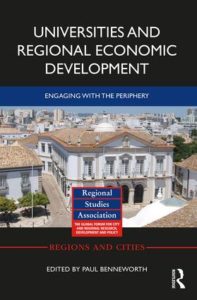I’d never intended to do research on universities and regional development. My first love was and is the North East of England, and what I wanted to understood was how the North East had gone in the course of my youth from being this busy, dirty industrial city to an abandoned, derelict wasteland marked by mass unemployment, demolitions and even the occasional riot.
I wanted to find out what had happened to all those firms, that seventy years previously had been world-leading, and were now either long disappeared or desperately clinging on for survival. And I was keen to find out whether the radical Conservative government’s recipe for recovery – assembly jobs for foreign investors – would be up to the challenge of reversing the decline.
What I found was a story of ingenuity and most of all innovation. The more traditional heavy engineering sectors were modernising and creating new ideas, technologies and products. Highly skilled electrical engineers were moving into information technology and software, the pharmaceutical industry was creating biotech, and energy companies were making ground-breaking advances in renewables.
UK markets and policies were consistently rigged against North Eastern companies in a system that had difficulty believing that good things could happen outside the ‘Golden Triangle’ of London-Oxford-Cambridge. But the one ever-present in these stories of perseverance were the local universities that could provide the stability and security for these innovative companies that the environment was so desperately lacking.
So after my Ph.D., I started to look at the roles of universities in modernising old industrial regions, specifically focusing on companies created by higher education institutions. I contrasted in the first instance the North East of England with Twente in the Netherlands, a university that had had no mean success in creating roughly twenty high-technology companies a year in a former textiles region.
But even twenty companies a year is a drop in the ocean of regional labour markets that may have employ hundreds of thousands or even millions of staff. This next round of research looked not just at the economic value of university companies for peripheral regions, but on the symbolic value that they had. What these spin-off companies did was give policy-makers and investors the confidence to invest in and prioritise innovation-led growth, to imagine, plan for and deliver science cities, knowledge districts and creative clusters.
Why would universities do this? After all, they are education institutions, not regional development agencies. Universities have for fifteen years been facing increased pressure to demonstrate internationalisation and excellence, to attract the best students and deliver the best research. Universities’ regional initiatives are all too often seen as being something second-rate, relevant rather than rigorous, engaged rather excellent.
Universities are knowledge-producing communities, and to engage actively with their regions, they need to integrate regional partners effectively into their knowledge activities. This requires understanding the ways that universities function as organisations, how they manage their knowledge creation, circulation and transfer activities in teaching and research and how external partners can be involved in these activities in ways that enrich those core knowledge production activities. There are always tensions and trade-offs to be made in balancing regional engagement with internationalisation and excellence, whilst the challenge remains how to get beyond what Arnoud Lagendijk & Paivi Oïnas memorably called the ‘happy family stories’ of regional development in successful regions.

That has been the focus of my research in the last eight or so years, looking at how universities as organisations engage in regional innovation strategies and coalitions, particularly at time when the policy orthodoxy is that universities should be absolutely core regional economic development partners. And that is the focus of my new edited volume on the RSA Cities & Regions series Universities and regional economic development: engaging with the periphery. Bringing together cases from Norway, the Czech Republic, Portugal, Finland, Estonia, and the Dutch-German border region, the volume provides a detailed empirical exploration of the ways in which universities may or may not be able to resolve these tensions and play these desired regional roles.
This book has three main messages for researchers, policy-makers and practitioners. For researchers there is a need to understand the roles played by institutional entrepreneurs in mobilising and sustaining new kinds of shared knowledge assets that can boost regional competitiveness. Policy-makers should embrace a more means-led rather than ends-led approach to strategy-making – particularly around entrepreneurial discovery processes – that seek to take a ‘good’ next step than strive for the ideal but undeliverable strategy. And universities should build from the bottom-up, identifying ways in which they can incorporate regional activities to enrich their own knowledge production processes and make them an essential element of their institutional strategies.
Paul Benneworth (@heravalue) is a senior researcher at the Center for Higher Education Policy Studies, University of Twente, the Netherlands, and at NORCE, Kristiansand, Norway. Paul’s research focuses on the dynamics of innovation and regional development and in particular the ways in which cooperations and coalitions function in supporting regional innovation processes. He has been chief scientist of projects for a range of research funders. He has published more than thirty peer-reviewed scientific articles in the last decade, serves as reviewer for a range of journals, research councils and funding agencies and currently acts as special scientific adviser to research council funded projects in Norway, Austria and Belgium.
Are you currently involved with regional research, policy, and development, and want to elaborate your ideas in a different medium? The Regional Studies Association is now accepting articles for their online blog. For more information, contact the Blog Editor at RSABlog@regionalstudies.org.